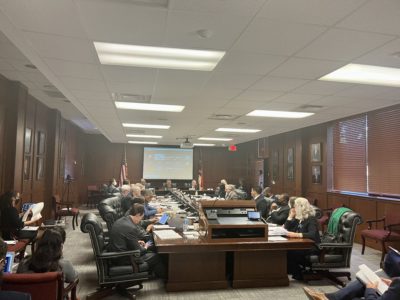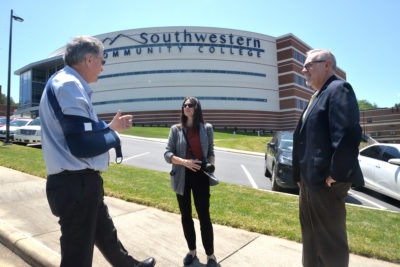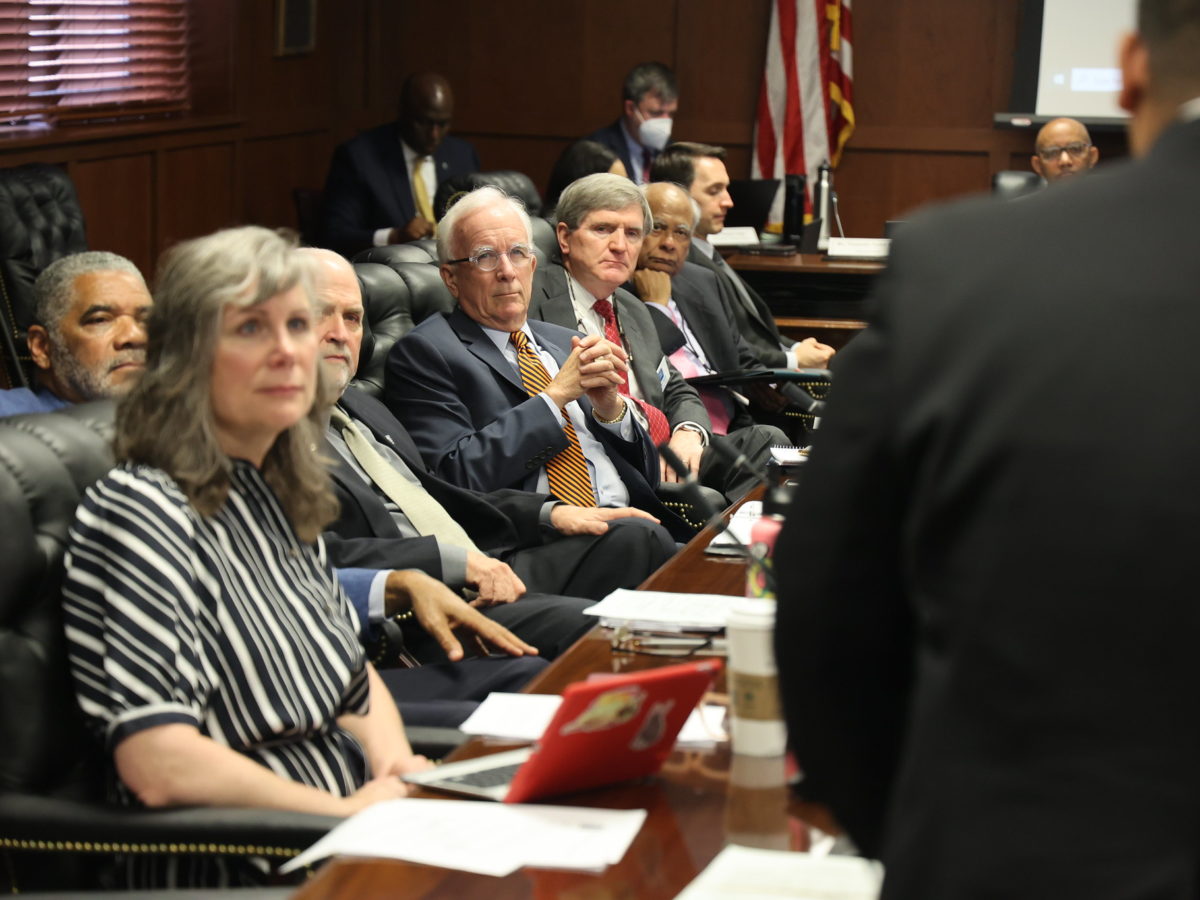
Share this story
- The State Board of Community Colleges met last week. The agenda included information about streamlining data systems between DPI and the community college system. Read more here.
- The State Board of Community Colleges, presidents, and system staff say they're pleased with the governor's budget and will continue to work hard to push their legislative priorities across the finish line.
|
|
The State Board of Community Colleges is making progress toward its strategic plan, providing an update at their May Board meeting. The agenda included a variety of topics – from amending bylaws regarding Board and system office staff communications to further discussions about the organizational assessment launched by the system office to streamlining data systems between the Department of Public Instruction and the community college system.
May marks the beginning of the legislative short session, a topic heavily discussed at the Board meeting last week. With the release of Gov. Roy Cooper’s budget, Board members and community college and system staff said they are happy to see the governor included their legislative priorities – plus some. You can read EdNC’s full overview of the priorities and Cooper’s budget here.
On June 8, community college presidents, Board members, and system office staff will travel to the North Carolina General Assembly to speak with their delegations about moving the system’s three-year legislative priority plan forward.
“Our presidents are going to continue to work to try to get those things across the finish line,” said Dr. Mark Poarch, president of the North Carolina Association of Community College Presidents (NCACCP).
Dr. Kenneth Boham was introduced during the Board meeting as Johnston Community College’s interim president. Boham served at Caldwell Community College & Technical Institute for more than 20 years.
Dr. Robert Shackleford, president of Randolph Community College, will retire at the end of June. The Board approved William Aiken as interim president for Randolph at their May meeting. Aiken served as president of Sampson Community College from 2000 to 2012.
Streamlining data systems between DPI and the community college system
Board members heard about the need for a comprehensive and cross-sector student management system between the North Carolina Department of Public Instruction (DPI) and the North Carolina Community College System (NCCCS).
During his report, Poarch shared how the community college presidents and North Carolina superintendents have been working collaboratively to address the issues presented by two data systems that do not connect. The two groups share roughly 70,000 students through Career and College Promise (CCP). Having separate systems causes barriers for students and limits the flow of information that could be used to support student completion across the sectors.
In April, the NCACCP and the North Carolina School Superintendents’ Association sent a letter about the cross-sector student management system to State Superintendent of Public Instruction Catherine Truitt, chair of the State Board of Education Eric Davis, NCCCS president Thomas Stith, and chair of the State Board of Community Colleges Burr Sullivan.
“The letter was designed to encourage us as separate systems to consider how we might partner to develop data solutions that meet the needs of students, educators, and policymakers so that we have the data needed for effective decision-making,” Poarch said.
By streamlining, students could transition between education systems easily, and it would give educators information that could be used as early warning indicators.
Poarch said the two groups are not asking that everyone use the same system but instead suggested they take the opportunity to think differently going forward and work together to find a solution to support North Carolina’s high school students.
Organizational assessment addressed
In December 2021, the system office launched an organizational assessment to ensure it is properly resourced to meet its vision and mission. CampusWorks conducted the assessment and presented an overview of their findings to the Board in April.
Board member Mark Merritt mentioned the findings from CampusWorks during the personnel committee meeting last week.
“What struck me about it was the number of human resources issues that it identified, including understaffing, gaps in key staffing roles and responsibilities,” Merritt said.
Merritt also said the assessment found the system office lacked consistent onboarding and clear job roles and responsibilities and had gaps in job descriptions. He asked that the personnel committee be given a report prior to their meetings as to how the system is addressing these issues.
“I view our retention issues as related to our lack of an appropriate human resources infrastructure,” Merritt said.
During each Board meeting, the personnel committee reviews a report that shows the number of vacant positions at the system office. As of May 12, 2022, the system had a total of 31 vacancies.
The report also includes metrics displaying the number of separations. From June 2021 to May 2022, there have been 54 separations — a turnover rate of 28.57%. Many of the separations were retirements (42.6%) followed by voluntary separations (33.3%). Internal transfers refer to individuals who move to another position within the system office while external transfers indicate the person left the system office to work for another state agency.
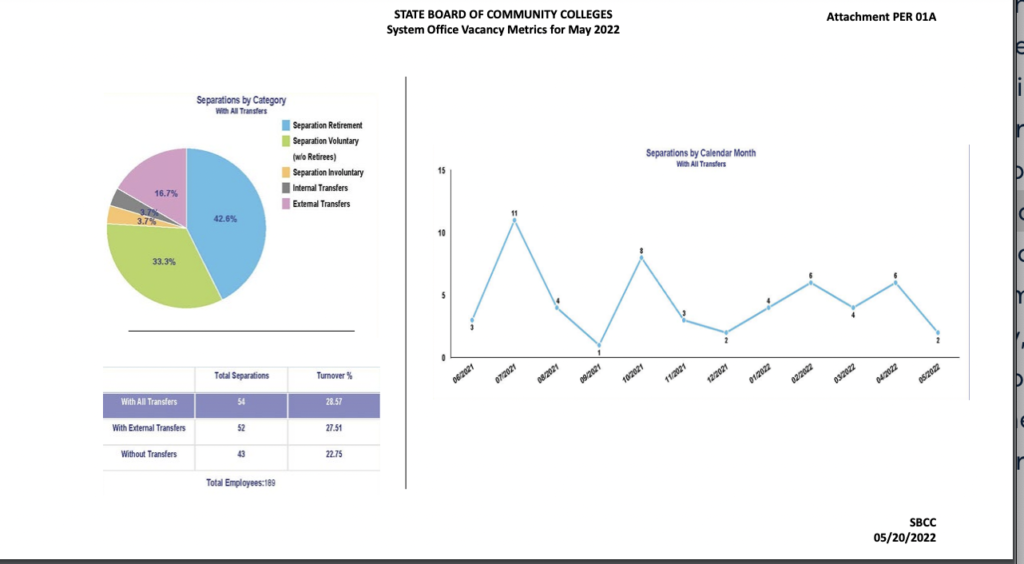
The CampusWorks’ assessment recommended the system office hire an HR executive to be part of the senior staff. Board members agree.
Board member Lisa Estep said as we are going through the “Great Resignation,” it will be crucial to have a dedicated plan for filling vacancies. Estep also said it was important to have a credentialed HR leader who understands how to receive and resolve employee grievances.
Both Bill McBrayer, vice-chair of the Board, and Stith commended the current HR team but understand there are areas for improvement when it comes to infrastructure and resources.
Stith said his team is moving forward with urgency to address the items rooted in HR and the other areas identified in the report.
McBrayer hopes CampusWorks can attend the July Board meeting to provide more insight on some of the findings.
Amending bylaws
During last month’s meeting, Board members expressed desire to amend the Board’s bylaws to provide more guidance on communication with system office staff.
Jerry Vaughn, chair of the policy and governance committee, said the genesis of amending the bylaws evolved from the Board’s need for information from staff, particularly non-senior level staff, in order to make decisions and study issues. Secondly, when issues are raised with Board members by staff, Vaughn said the Board wants to treat those concerns properly and in a way that is respectful and follows the chain of command.
After April’s meeting, Sullivan drafted a letter outlining suggestions for amendments on communications between the Board and system office staff. The draft language was then sent to the system office for review. Senior team members from the system office met to discuss the draft language and later submitted feedback to Sullivan’s draft letter.
Some of the feedback from the system office included national resources for the Board to use when amending bylaws regarding communications, the recommendation for clearly defined communication channels between Board and staff, and the suggestion that if employees initiate conversations with Board members about the organizational effectiveness of the system office, that Board members should bring any concerns to the system president instead of reporting the concerns to Board leadership. You can view the full response here.
During the committee’s discussion, two Board members expressed that they had not received Sullivan’s draft letter, and it was not included in the Board packet. Tawanda Artis, general counsel for NCCCS, said while it was discussed last month she was not certain if committee members received a physical copy of the letter but indicated she would provide copies.
Vaughn shared that as a result of the Board’s self-evaluation, Sullivan created a bylaws subcommittee to tackle items like agenda setting, committee charters, and communications between Board and system office staff.
The committee plans to have a more in-depth discussion about the bylaws at its July meeting. The Board does not meet in June.
Strategic planning updates
After months of regional listening sessions across the state, the strategic planning committee honed in on five major themes to be addressed. Those themes include: faculty and staff recruitment and retention, enrollment, student success for all, workforce development, and system funding and effectiveness.
Each theme represents a planning team composed of subject matter experts, including a leader from the system office, two college presidents, and a Board member. The teams are charged with taking the broad information received during the listening sessions and narrowing it into key objectives, strategies, and tactics. All teams will have at least three meetings that will conclude by June 6.
The committee hopes to have a draft of the strategic plan by the July Board meeting and anticipates final approval in August.
Expanding apprenticeships and a new student government liaison
The Board approved an allocation of over $11 million from state fiscal recovery funds to establish a temporary program to expand apprenticeship opportunities. The opportunities are for high school and non-high school apprentices who are between the ages of 16 and 25. Funding is available for 50 eligible community colleges serving Tier 1 and Tier 2 counties. Expanding the program is an effort to meet employment demand in local communities and provide opportunities for apprentices to earn a credential.
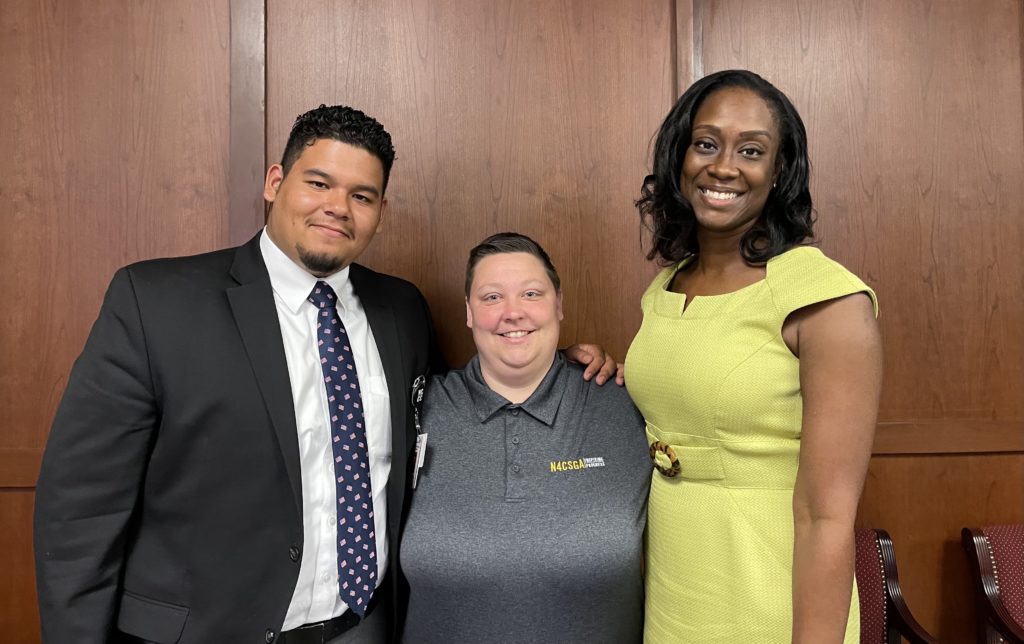
Nathan Vasquez, Board member and liaison to the North Carolina Comprehensive College Student Government Association (N4CSGA) gave his final report telling the Board and system office staff that his success is also their success. Vasquez graduated from Gaston College and Gaston Early College High School this month. LaTasha Bradford will be the new N4CSGA liaison starting in July.
The State Board of Community Colleges will not meet in June. The next meeting will be held July 14-15.



